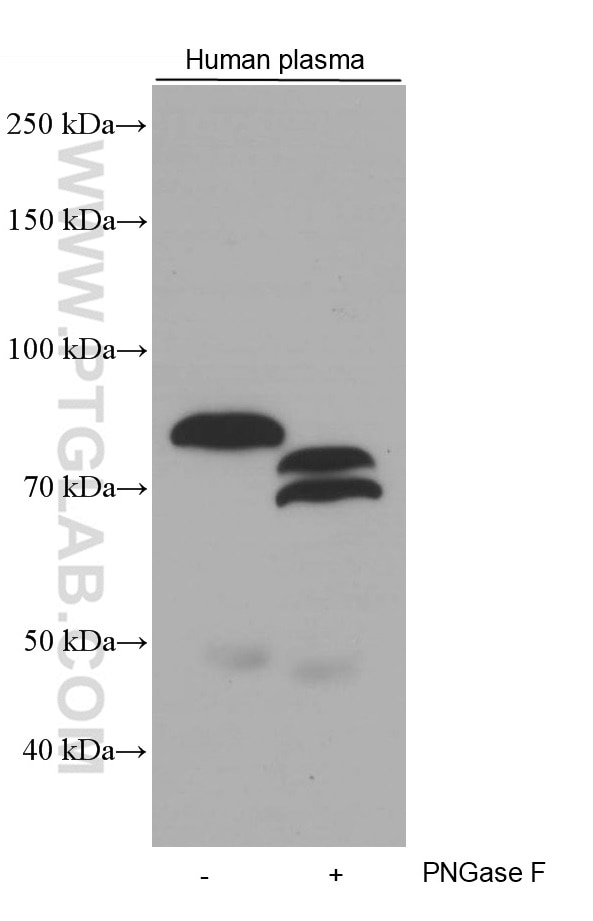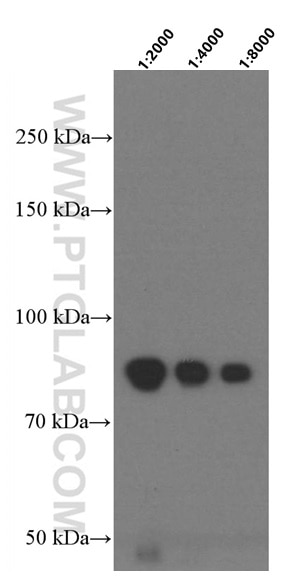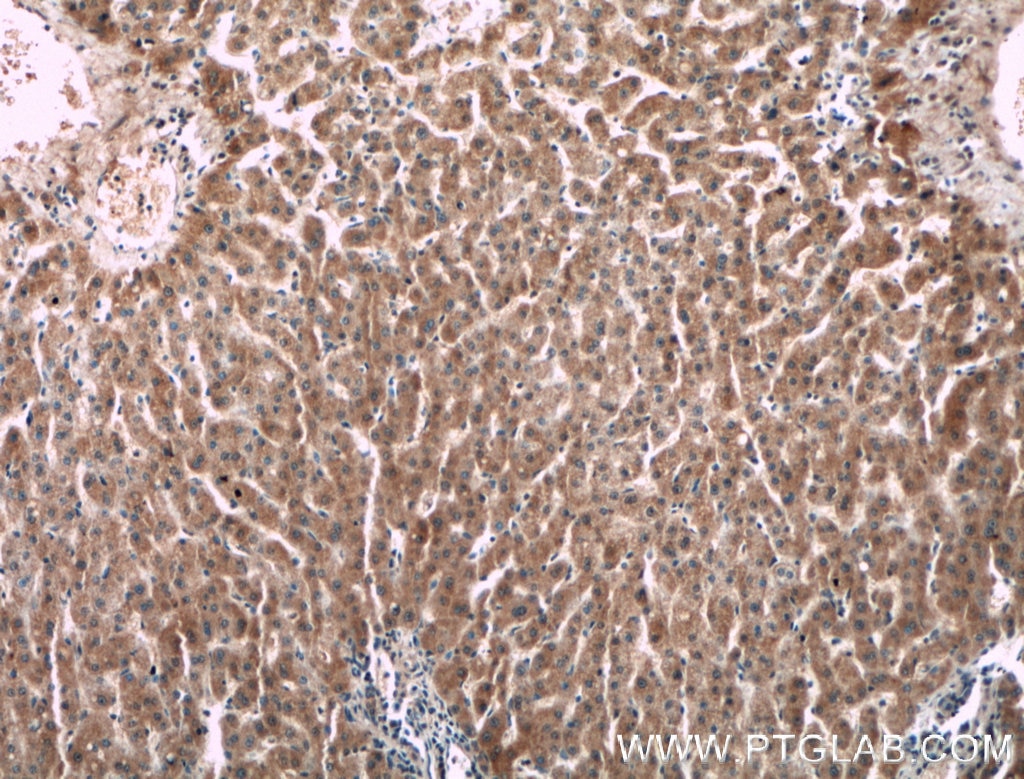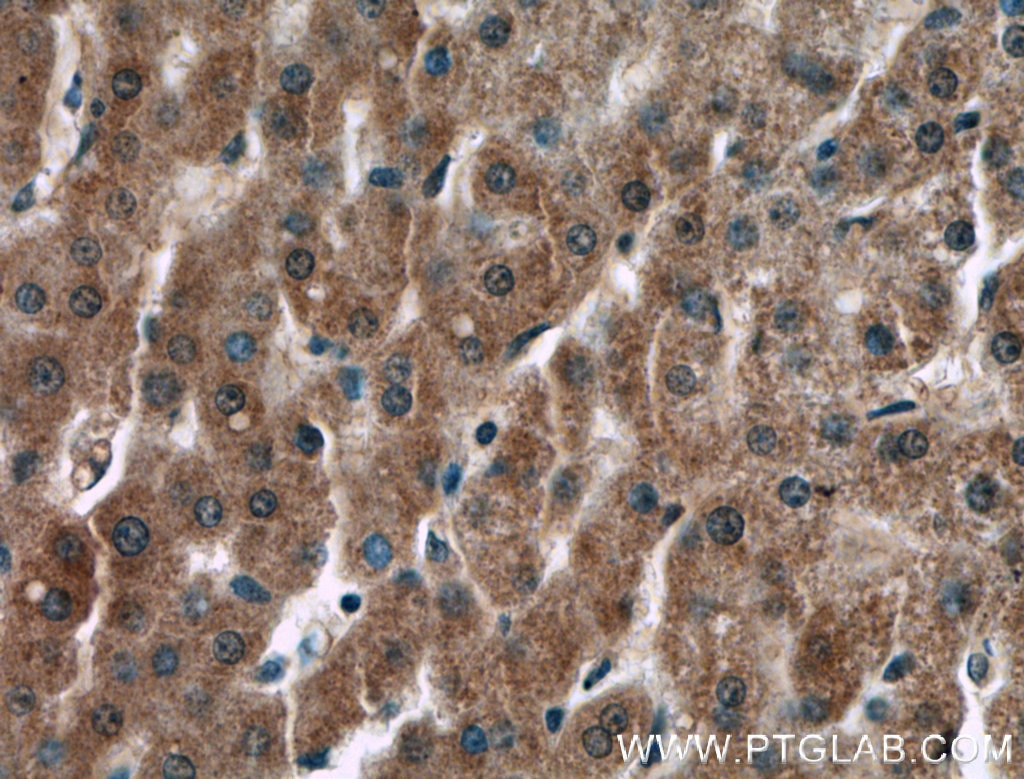Tested Applications
| Positive WB detected in | human plasma tissue |
| Positive IHC detected in | human liver tissue Note: suggested antigen retrieval with TE buffer pH 9.0; (*) Alternatively, antigen retrieval may be performed with citrate buffer pH 6.0 |
Recommended dilution
| Application | Dilution |
|---|---|
| Western Blot (WB) | WB : 1:1000-1:4000 |
| Immunohistochemistry (IHC) | IHC : 1:50-1:500 |
| It is recommended that this reagent should be titrated in each testing system to obtain optimal results. | |
| Sample-dependent, Check data in validation data gallery. | |
Published Applications
| WB | See 1 publications below |
Product Information
66509-1-Ig targets Coagulation Factor II in WB, IHC, ELISA applications and shows reactivity with human samples.
| Tested Reactivity | human |
| Cited Reactivity | pig |
| Host / Isotype | Mouse / IgG1 |
| Class | Monoclonal |
| Type | Antibody |
| Immunogen |
CatNo: Ag18385 Product name: Recombinant human F2 protein Source: e coli.-derived, PET28a Tag: 6*His Domain: 273-622 aa of BC051332 Sequence: WCYVAGKPGDFGYCDLNYCEEAVEEETGDGLDEDSDRAIEGRTATSEYQTFFNPRTFGSGEADCGLRPLFEKKSLEDKTERELLESYIDGRIVEGSDAEIGMSPWQVMLFRKSPQELLCGASLISDRWVLTAAHCLLYPPWDKNFTENDLLVRIGKHSRTRYERNIEKISMLEKIYIHPRYNWRENLDRDIALMKLKKPVAFSDYIHPVCLPDRETAASLLQAGYKGRVTGWGNLKETWTANVGKGQPSVLQVVNLPIVERPVCKDSTRIRITDNMFCAGYKPDEGKRGDACEGDSGGPFVMKSPFNNRWYQMGIVSWGEGCDRDGKYGFYTHVFRLKKWIQKVIDQFGE Predict reactive species |
| Full Name | coagulation factor II (prothrombin) |
| Calculated Molecular Weight | 622 aa, 70 kDa |
| Observed Molecular Weight | 70-80 kDa |
| GenBank Accession Number | BC051332 |
| Gene Symbol | F2 |
| Gene ID (NCBI) | 2147 |
| RRID | AB_2881872 |
| Conjugate | Unconjugated |
| Form | Liquid |
| Purification Method | Protein G purification |
| UNIPROT ID | P00734 |
| Storage Buffer | PBS with 0.02% sodium azide and 50% glycerol, pH 7.3. |
| Storage Conditions | Store at -20°C. Stable for one year after shipment. Aliquoting is unnecessary for -20oC storage. 20ul sizes contain 0.1% BSA. |
Background Information
Normal blood coagulation is a complex process, involving a cascade of activation of different plasma proteins, ultimately resulting in the formation of a clot, called fibrin. Coagulation Factor II, also known as prothrombin or factor II, is one of the components of this chain of plasma proteins involved in blood coagulation. Prothrombin is the precursor of thrombin, which is essential in the processes of hemostasis and thrombosis.
Protocols
| Product Specific Protocols | |
|---|---|
| IHC protocol for Coagulation Factor II antibody 66509-1-Ig | Download protocol |
| WB protocol for Coagulation Factor II antibody 66509-1-Ig | Download protocol |
| Standard Protocols | |
|---|---|
| Click here to view our Standard Protocols |










